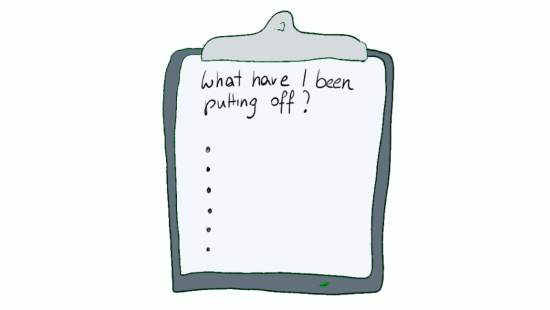A way of at looking at frustration:
Being frustrated is a state of accumulated little annoyances whose energy hasn’t been used to resolve the issues at hand and instead manifest in a state of stuckness.
Frustration is a bucket of ‘negative’ emotion that has accumulated over time. The small things you have overlooked or ignored because they’re not a ‘big deal’. Yet, deep down you know there have been moments when you ignored your gut feeling, didn’t listen to your needs or felt you couldn’t say no.
At some point these little moments do turn into a big deal: you have collected a potpourri of small disappointments, irritations and annoyances.
The result: frustration.
Frustration can be dull state of heaviness and lack of energy. You feel nothing is going your way. It is frequently entailed by tensions, a lack of motivation or paralysis.
You are stuck on the feeling of frustration and don’t know how to move on.
This way to consider frustration as a collection of little things has been inspired by Guy Claxton and how he looks at anxiety in his book Intelligence in the Flesh.
He writes,
in ‘anxiety mode… you are unsure which of the emotional modes it is appropriate to engage. Is it a trick or a treat? Can I escape (fear) or should I stay and fight it out (anger)?’
Anxiety is a confusion where you don’t know what is the proper emotion to have and in which direction it is guiding you.
Similarly, frustration is a state of confusion where many small situations have merged into one big pot of soup that you can’t tell what exactly it is that bothers you. The underlying emotion, anger, is clear. but you lack the ability to act as the reasons for your state are unclear. It’s an overall state of dissatisfaction. Very often, it’s also a state where all you can perceive is the problem(s) and no solutions.
How to get out of frustration paralysis?
One strategy is to make a List of Frustrations

When I get stuck and can’t figure out what’s off, one of the strategies that has worked well for me is to write a list of all the things I’ve put off for too long. The little and bigger things that I know are important to me, but that I haven’t given the attention they deserve. These are the elements that I have neglected (and am aware of) that have added to the grey and bland soup of stuck frustration.
Some examples:
- Planning the holiday I really want to make happen this year
- Doing my bookkeeping
- Reading just for fun and not for learning or work
- Doing laundry
- Treating myself to a new haircut
- Answering emails that aren’t top priority
- Making a dreaded phone call
Some of those items might seem insignificant, others more emotional or difficult. There is not hierarchy among them. What matters is that you start looking at the soup of frustration and identify ingredients that have led you into stuckness.
What are the things you planned to do but didn’t? What did you need and ignored?
You can bring your attention to those frustrations that are still on your mind and transform the energy that’s contained in them for moving out of stuckness.
You don’t have to find the root cause or ‘the’ solution to the problem.
What matters is that you have the intention to get back on your own path and realign your thinking, emotions and physical being.
By making this list you practice your ability to transform frustration into discernment. It allows you to take action where needed and let go of things that are no longer serving your purpose. It allows you to refocus your attention on what matters.
Start somewhere
Once you have the list, you can choose to start somewhere and clear up the mess that has accumulated inside of you.
This kind of ‘clearing’ process can take a while. Maybe you want to dedicate a half-day to take care of it, or you choose to do one item at a time.
It will release energy because you no longer need to be busy with them (consciously or unconsciously).

This process requires honesty and courage
Honesty and courage are vital ingredients for transforming frustration and moving out of stuckness.
To be able to write the list of frustrations requires honesty. (You don’t need to show or tell anyone about it. It is a private affair. Yet, it can be uncomfortable to do it.)
And it takes courage to tackle the items and do something about them afterwards.
A major benefit of working with this list is that you see that it’s not one big thing you need to do, but that you can choose to deal with one aspect at a time and that every step you take brings you back to clarity, opens up new energy resources, … and most of all it strengthens your confidence and trust in yourself that you are taking care of what matters to you.
Wherever you start is fine.
Start somewhere.

0 Comments